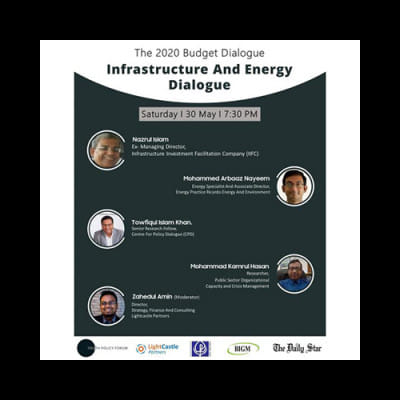YPF urges to fight corruption, reduce time and budget overrun in Energy and Infrastructure projects
On 30th of May, Youth Policy Forum (YPF) organised the fourth instalment of YPF 2020 Budget Dialogue, this time on the Infrastructure and Energy sector.

The dialogue was a part of the sectoral analysis for the upcoming budget, with the purpose being to generate ideas with help from young professionals and students and convey them to policymakers, so they can understand the expectations of the youth from the budget for Fiscal Year 2020-21.
A team from YPF presented their findings from a study they conducted over the previous budgets and sector-based necessities. It showed that the physical infrastructure sector -- comprising road, transport, bridges, railway, shipping and civil aviation -- has not utilised the budget of FY2019-20 at a satisfactory rate till February of 2020.
A panel discussion was initiated as well -- the discussion was moderated by Zahedul Amin, director, Light Castle Partners. The panel consisted of Nazrul Islam, ex-managing director, Infrastructure Investment Facilitation Company (IIFC); Mohammed Arbaaz Naeem, energy specialist, associate director, Ricardo Energy and Investment; Towfiqul Islam Khan, senior research fellow at Centre for Policy Dialogue; and Mohammad Kamrul Hasan, a researcher in public sector management.
The research from YPF suggested that public private partnership could be a useful mechanism to face any crisis after Covid-19, which Mr. Nazrul Islam agreed with.
He said, "Because of the market downturn, we need to reconsider the projects that are in hand. This year and the next year's budget will be different because it is difficult to understand how to mobilize our resources in order to mitigate the negative impacts of the pandemic and Covid-19 should be at the centre of any plan. Due to Covid-19, we are currently in the middle of force majeure in all our projects (in the construction phase) and in all our contracts (in the operations phase). All of our project directors and managers should study the force majeure clauses in their respective contracts and invoke the clauses in order to minimise losses arising from the effects of the pandemic."
As the YPF study showed there is excess energy in the country which needs to be utilised, Arbaaz Nayeem stated that the challenge for Bangladesh is not around excess energy, rather around increasing customer demand.
In relation to Private Power Agreements, he mentioned that PPAs should not be renegotiated because any renegotiation might discourage investment in the power sector of Bangladesh, which is already an unattractive investment scheme for the western countries. He also added that outside Dhaka, load shedding is still observed, so there is a lot of suppressed demand and there is a need for more investment in transmission and distribution of energy.
Moreover, he stated that once the manufacturing sector picks up, the country will be quickly returning to high plant load factors. He suggested subsidising domestic manufacturers and encouraging cooperatives. For example - the retailers in IDB Bhaban who fix our computers can be encouraged to make computers. Also if our school curriculum focuses more around IT, this might help the digital sectors grow in the future. In the context of gas exploration he stated that it's not the best time for greater gas exploration since the price of gas fell to negative figures in the US markets during the pandemic. Additionally, he remarked that the idea of exporting power is not suitable since the demand in India or Myanmar to import power is low.
According to Mohammad Kamrul Hasan's suggestion, projects need to be more efficient and we need to figure out an efficient way to produce power. It can be renewable energy since in the long run it is efficient and less expensive so the country can start by implementing it on a small scale. Affinity to use green energy might help to attract investment from developed countries according to Towfiqul Islam. Arbaaz Nayeem added there is a high probability that due to lower cost of carbon based energy after reopening, the carbon based rebound can happen.
Towfiqul Islam Khan stated that "Dependency on imported power has to be reduced because the price can be very volatile since it depends on the foreign currency."
In the post Covid-19 era Bangladesh should focus on innovative approaches to make projects more efficient according to him. Proper implementation, designing the projects sufficiently while studying feasibility could help.
"We have to prioritize the projects and continue only those which will be beneficial in future, in the question of attracting investments after the pandemic" he added.
Nazrul Islam said "We don't have enough capacity to attract investment," where Towfiqul Islam added that infrastructural development can help.
In an answer to a question raised by the audience regarding making the power sector more gender inclusive, Arbaaz Nayeem said no job or sector should be considered as gender appropriate or inappropriate and it must be ensured that citizens are able to fill jobs that they want to fill and in sectors that they are excited to work in.

 For all latest news, follow The Daily Star's Google News channel.
For all latest news, follow The Daily Star's Google News channel. 



Comments